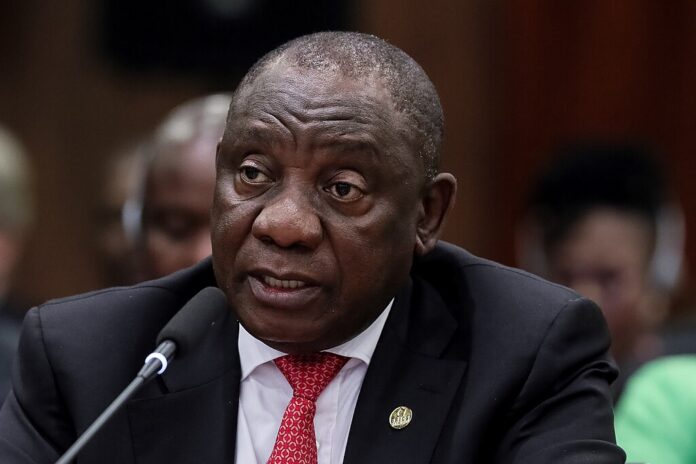President Cyril Ramaphosa reassigns management of key state-owned enterprises, signalling a major administrative overhaul
President Cyril Ramaphosa has announced a major restructuring in the management of South Africa’s state-owned enterprises (SOEs). The change comes as part of a broader effort to enhance oversight and efficiency within these critical institutions. Under the new arrangement, the Department of Public Enterprises (DPE) will no longer oversee these entities directly.
Instead, each state-owned enterprise will now fall under the purview of relevant sectoral ministries. Eskom, South Africa’s power utility, will be managed by Kgosientsho Ramokgopa, the new Minister of Electricity and Energy. This shift aims to address the longstanding issues with Eskom’s performance, which has been plagued by power shortages and financial difficulties.
Embed from Getty ImagesSouth African Airways and SA Express, the country’s major airlines, will now come under the Department of Transport, led by Minister Barbara Creecy. The move reflects an effort to improve the operational efficiency of these airlines, which have faced significant financial and management challenges in recent years.
Denel, the state-owned defense manufacturer, will be overseen by Angie Motshekga, the Minister of Defence. This change is expected to streamline the governance of Denel, which has struggled with financial instability and allegations of mismanagement.
Vincent Magwenya, spokesperson for The Presidency, confirmed that although the DPE will continue to exist temporarily, its role will be significantly reduced. The department will manage its transition until its resources and responsibilities are fully transferred to the relevant ministries.
This reorganization reflects Ramaphosa’s commitment to improving the management of state-owned enterprises and ensuring that each entity is under the direct supervision of a minister with expertise in the relevant sector. By aligning each SOE with its respective ministry, the administration aims to enhance accountability, efficiency, and overall performance.
Analysis
Political: President Cyril Ramaphosa’s decision to reassign oversight of state-owned enterprises marks a significant shift in South Africa’s administrative landscape. This move aligns with Ramaphosa’s broader strategy to reform governance and improve the efficiency of public institutions. By placing SOEs under sector-specific ministries, the administration aims to address the systemic issues that have plagued these entities. The shift could strengthen Ramaphosa’s political position by demonstrating a commitment to addressing public sector inefficiencies and restoring confidence in state-owned enterprises.
However, this reorganization also presents potential political risks. The success of the new arrangement will depend on the effectiveness of the sectoral ministers and their ability to manage the transferred responsibilities. Any failures or continued issues within these SOEs could reflect poorly on Ramaphosa’s administration, impacting his political standing and the overall perception of his leadership.
Social: The restructuring of SOE oversight reflects broader societal concerns about the effectiveness and accountability of public institutions. South Africans have long expressed frustration with the performance of state-owned enterprises, particularly Eskom, which has faced frequent power outages and financial difficulties. By reallocating oversight to relevant ministries, the administration aims to address these concerns and improve service delivery.
This change could also influence public perceptions of governance and transparency. If the new arrangement leads to improved performance and service delivery, it could enhance public trust in government institutions. Conversely, if the reorganization fails to deliver the anticipated improvements, it could further erode confidence in the government’s ability to manage key public assets.
Racial: The reorganization of state-owned enterprises does not directly address racial issues, but it has implications for equitable access to services and opportunities. Improved management of entities like Eskom and South African Airways could enhance service delivery to communities across the country, potentially benefiting marginalized and underserved populations. Effective governance of these SOEs could contribute to more equitable access to essential services and economic opportunities, thereby supporting broader social and racial equity goals.
Gender: The appointment of female ministers to oversee key state-owned enterprises reflects ongoing efforts to promote gender representation in leadership positions. Barbara Creecy and Angie Motshekga’s new roles highlight the administration’s commitment to gender diversity in senior government positions. Their performance in these roles will be closely scrutinized, as their ability to manage these critical entities could influence perceptions of gender equality and leadership effectiveness in South Africa.
Economic: Economically, the reallocation of SOE oversight has significant implications for South Africa’s financial stability and growth. Effective management of state-owned enterprises like Eskom and South African Airways is crucial for maintaining economic stability and promoting growth. Improved performance and financial health of these entities could positively impact the broader economy by ensuring reliable power supply, efficient transportation, and effective defense manufacturing.
The success of this reorganization will depend on the ability of the new ministers to address the systemic issues facing these SOEs. If managed effectively, the restructuring could enhance the overall economic performance of these entities, contributing to economic growth and stability. Conversely, continued challenges or mismanagement could exacerbate existing economic issues and impact public confidence in the government’s economic policies.
